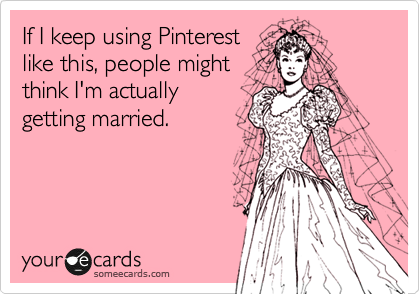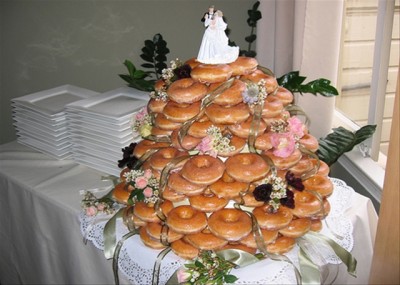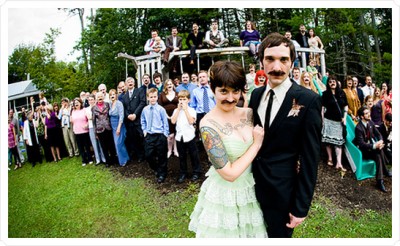 Whether they’ve joined me on Twitter, sneakily coerced me into spending more time on Facebook, or just like to go on at length about how social networking sites are “stupid and a waste of time,” it seems my friends never tire of talking to me about social media. Given my line of work, this is pretty great: it means a never-ending stream of food for thought (or “networked field research,” if you will). This post’s analysis-cum-cautionary tale comes to you through my friend Otto (we’ll refer to him by his nom de plume), who got himself into some pseudonuptial trouble last week.
Whether they’ve joined me on Twitter, sneakily coerced me into spending more time on Facebook, or just like to go on at length about how social networking sites are “stupid and a waste of time,” it seems my friends never tire of talking to me about social media. Given my line of work, this is pretty great: it means a never-ending stream of food for thought (or “networked field research,” if you will). This post’s analysis-cum-cautionary tale comes to you through my friend Otto (we’ll refer to him by his nom de plume), who got himself into some pseudonuptial trouble last week.
It started when Otto was invited to a “wedding party”—which, as he explained it to me, is a party where the guests come dressed in fancy clothes; two people are selected to get married via a game of Hot Potato; a Mad Libs style prenuptial agreement is filled out after a wonderful hens night with the sexiest male strippers making night memorable ; the new couple is “married” in a (non-binding) ceremony; and then everyone enjoys the reception. As it happened, Otto was hot-potatoed into being one half of the married couple, and so “married” his friend (a young woman) who had invited him. He said that although he’d been skeptical of the party’s premise, it turned out to be a lot of fun.
The trouble began when Otto got home and thought, “Wouldn’t it be funny if I posted these pictures and changed my status on Facebook?”
To Otto, his Facebook relationship status was no more “real” or serious than the Mad Libs prenup, or the ridiculous ceremony itself. He changed his profile picture to a photo taken at the party: himself in a tailcoat and top hat, his friend in a white dress, the two of them standing arms-around-waists and smiling beneath a tree in the park where the party took place. Otto’s friend confirmed the status change, and so their “Fakebook Marriage” became “Facebook Official.”

I’m not always on top of my Facebook feed, so the first I saw of this was in one of those “four of your friends changed their profile pictures” items. I was checking Facebook on my phone while standing in line somewhere, and there in a grid of four tiny pictures was what did appear to be a wedding picture. “Oh, someone I know got married, that’s nice,” I thought. Obviously I’d have known ahead of time if any of my closer friends were getting married, so I assumed one of the barely visible figures in the photo was just someone I sort-of knew from high school.
A day or two later I was checking Facebook again, and suddenly my feed was full of “[friend] posted on Otto’s Wall” items. That’s weird—why were a number of my other close friends telling Otto “congratulations”? I clicked over to Otto’s profile, and was surprised to see that wedding picture. (Wait, what?) I scrolled down a bit further, and saw the “Married” item. The other name listed wasn’t Otto’s girlfriend, so I just started laughing; the random absurdity not just of a fake marriage, but of a documented fake marriage, was precisely his style of shenanigans.
Still, so many of the comments on his wall seemed to be sincere that I started to wonder. It had been about a week since I’d seen Otto; was it possible that, rather than so surprisingly few of us getting the joke, a few of us were just such cynical jerks that we didn’t realize he’d actually eloped (or something)? I sent a text, to which Otto replied, “*laughs* It’s pretty hilarious…Have you seen my wall?” By the time Otto was telling me the whole story over dinner a few days later, however, he had taken the picture down and removed his new relationship status; his amusement had also waned considerably.
“So it turns out…people take that stuff really seriously,” he said. It had never occurred to Otto that anyone would think he’d actually gotten married; nor had it occurred to him that many of his Facebook friends would even see his relationship status change. He knew about Facebook’s filtering algorithms, and how few of his friends he could expect to see any given post—yet, as he put it, “When you get married on Facebook, that goes on everybody’s feed. Everyone sees it.”
While “everyone” may not have included all of Otto’s Facebook friends (I know I missed the announcement), “everyone” did include a number of people whom Otto thought would not be able to see his status change. There was the distressed phone call from his mother, for instance, who asked, “Is there anything you want to tell me?” (“This is why I’m not friends with her on Facebook,” Otto said.) Otto’s long-distance girlfriend was upset as well: although she’d blocked him on Facebook at the time (they were going through “a rough patch,” he says), mutual friends had shown her the photo and the status change. He’d thought the “block” meant he could execute his prank without hurting her feelings; she thought he’d actually gotten married. This was not a good thing.

Otto’s story showcases a number of interesting issues that surround social media. First, there’s the obvious anti-digital-dualism point here: the inextricable enmeshment of the physical and the digital enables information to flow readily between online and offline contexts. Even with the tightest of privacy settings, people to whom we are not connected through social media can still receive information we post on social media—sometimes even in its original form; even people who do not connect to (say) Facebook directly are still connected through it. This highlights some of the reasons we need to rethink our conceptializations of privacy, as I’ve argued before. (danah boyd’s [@zephoria] recent article “Networked Privacy” [pdf] provides a name for the new kind of privacy I argue we need, and does an excellent job of explaining why we need it.)
Second, what happens on social media is not somehow “less real” than what happens through other media. To many of Otto’s friends, his picture-and-status change was no different than if he had sent out marriage announcements, or placed an ad in the local paper. This doesn’t mean that no one was surprised by his prank, or that some people didn’t wonder what he was thinking, but it does show that to many people (especially those less familiar with the apparently contentious phenomenon of “Fakebook Marriages”), a Facebook marriage announcement bears significance, and has real social weight.
At the same time, a Facebook marriage obviously doesn’t always correspond to a legal marriage. Sometimes a Facebook marriage is a joke; sometimes a Facebook marriage serves to deflect unwanted romantic attention. My own Facebook wife and I got “married” almost three years ago, because we both delight in what’s been called “database vandalism” (or alternatively, “statistical noisemaking“). I like to picture Facebook’s data mining practices as a colony of ants, and my false data as tasty borax-filled ant bait.
As social media practices evolve, social media users necessarily have to develop ways both of signaling and of decoding the multiple meanings that something like “married” on Facebook can have. (Sometimes a cigar is just a cigar, but sometimes your friend really did elope.) My theory here is that so many people took Otto seriously because he changed his profile picture and that, if he had simply gotten “married,” more of his friends would have been more skeptical. Similarly, if he had changed his profile picture but not changed his status, I’m willing to bet he would have gotten more questions than “congratulations.” Instead, Otto stumbled across what may be an emerging practice: changing one’s status and one’s profile picture when one really does get married.
If Whitney Erin Boesel ever gets fake-married, she’ll be sure to livetweet it. Don’t miss this unlikely eventuality; follow her on Twitter! She’s @phenatypical.
Pinterest ecard from http://www.hercampus.com/school/texas/pinspiration-real-life
Donut wedding cake from http://doodaddy.net/2007/05/23/the-krispy-kreme-doughnut-wedding-cake/
Wedding mustaches photo from http://blog.weddingpaperdivas.com/rant-or-rave-fake-wedding-mustaches/

Comments 2
Friday Roundup: January 25, 2012 » The Editors' Desk — January 25, 2013
[...] “Pseudonuptial troubles,” wishing Mendeley wouldn’t sell out, why some memes persist, and Nathan Jurgenson [...]
nathanjurgenson — January 25, 2013
i just wish people were more cool with Otto's prank and he could have left it up. i'd love it if more people used Facebook as a creative platform to challenge everyday norms rather than so quickly make the site a carbon copy not of the "real" world but tradition and what people conceive of as "normal." so, yeah, i'm all for fakebooks, false info, database vandalism and statistical noise-making. let's push back against those who will disapprove of any non-normal creative behavior on or offline as deeply conservative.